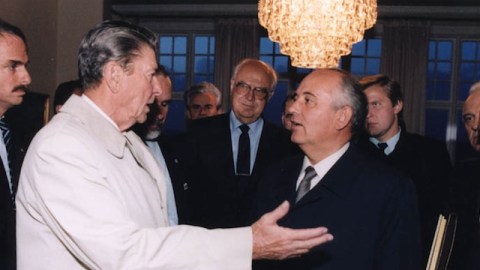Losing Reagan’s Legacy

When 71 senators to voted to ratify New START it was a huge victory for Obama and the Democrats. The vote would normally have been a victory for Republicans. The original START—which stands for Strategic Arms Reduction Treaty—was one of Ronald Reagan’s signature achievements. Ultimately signed by George H.W. Bush a few months after the fall of the Soviet Union, the treaty limited the size of Russia’s nuclear arsenal and played a key role in getting the post-Soviet republics of Ukraine, Kazakhstan, and Belarus to disarm. And it gave us the ability to monitor the Russian weapons program. It put in to practice Reagan’s belief that we should “trust, but verify.”
But Republicans opposed New START in large numbers. The new treaty, which became necessary when the original START expired this year, will not only allow us to continue monitoring the Russian nuclear weapons program, but will help to isolate the Iranian and North Korean weapons programs. Republican leaders argued that the new treaty concedes too much, and will limit our ability to defend ourselves against nuclear attacks. But while you can always negotiate a better treaty, as Fred Kaplan shows, these objections are almost completely groundless—which is why both Adm. Mike Mullen, Chairman of the Joint Chiefs of Staff, and every living former Republican Secretary of State has endorsed the treaty. Brent Scowcroft, National Security Advisor to both Gerald Ford and George H.W. Bush, says Republican opposition to the treaty is “baffling.”
The truth was that most of the opposition to the treaty wasn’t serious, but was part of a larger strategy to keep Democrats from accomplishing anything during the lame duck session of Congress. Sen. John Kyl (R-AZ), the key Republican on nuclear weapons policy, announced that he opposed the treaty in spite of getting the Obama administration to agree to modernize the country’s nuclear arsenal on the grounds the administration wasn’t “committed in the heart” to modernization. Senate Minority Leader Mitch McConnell (R-KY) wanted to put off the vote because, he said, senators weren’t “thoroughly familiar” with the treaty—even though the 17 page document has been available since April. And Kyl complained that even asking senators to work this week disrespected “one of the two holiest holidays for Christians and the families of all the Senate,” prompting Sen. John Kerry (D-MA) to respond that “The question is not whether we get out of here for a holiday. The question is whether we move the world a little more out of the dark shadow of nuclear nightmare.”
In the end, just 11 Republicans joined with Democrats to ratify the treaty. As Adam Serwer writes, Republican obstructionism turned what ought to have been a bipartisan accomplishment that invoked one of Reagan’s great foreign policy successes into a victory for Obama in the face or Republican opposition.
That’s the danger of obstructionism. Opposing almost everything in Congress over the last two years—and even portraying a health care bill based on Mitt Romney’s as a liberal “monstrosity”—allowed Republicans to make the Democrats seem partisan and ineffective. Although it was one of the most productive Congresses in decades, the idea that Democrats couldn’t get anything done helped Republicans win a huge victory in the midterm elections. But by opposing everything Republicans also allowed the Democrats to take the lead on—and get credit for—what would otherwise be uncontroversial Republican achievements.





